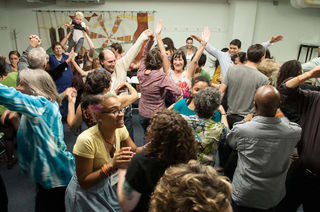Play
Play as if Your Mental Health Depended on It
Play helps us move around depression, anxiety, hopelessness and loneliness.
Posted November 2, 2016

I don’t like labels, so one of the things I play around with is what to call myself. I used to say I’m a developmental psychologist, since that’s what I was trained to be. But developmental psychology is an academic discipline that studies people and explains them in ways I have some big problems with. So I started to call myself a developmentalist to highlight that I try to help people develop and grow. I also sometimes say I’m an activity-ist since it’s human activity and not behavior that I am interested in and want to foster. Lately I’ve been saying I’m a play revolutionary. Now you might find it strange to put those two words together. But they’re more similar than you think. Both play and revolution transform what is into something qualitatively different. As a play revolutionary, I believe that play can revolutionarily transform the world and all of its people.
Until recently if I had to come up with an opposite of play I would say it’s what learning has become in our rigid, structured, test-driven elementary, middle and high school classrooms. There’s no play there. Even at the university level, play tends to be separated out into sports and the theatre department.
Growing up socialized to a world divided in this way, no matter our age, we’re deprived of the emotional, social and intellectual growth that play provides us in all areas of our lives. In the past decade, this deprivation has reached epidemic proportions in the U.S. and many other highly industrialized countries. Anthropologist and pioneer play researcher Brian Sutton-Smith spoke to the depth of the deprivation of play when he wrote, “The opposite of play is not a present reality or work. It is depression.”
This is especially serious when so many experts are telling us there’s an epidemic of depression in the US across the lifespan. Depression, along with anxiety, hopelessness and loneliness are the most frequent feelings college students report, according to about a dozen national surveys done by associations of university and college counseling centers, college health services, and the American Psychological Association. And the number has risen dramatically in the last ten years—with 35-45% of college students currently reporting these as reasons they sought help.
Play helps us move about and around depression, anxiety, hopelessness and loneliness. Play doesn’t merely change us; it transforms us. Change adds or subtracts—it has to do with quantity. Transformation “changes everything”—it has to do with quality. It makes what is into something qualitatively new.
I’m writing this and you’re reading it because we played our way into becoming who we are today. Way back when, we were babbling, crawling little babies. Way back when, we played—and it changed everything. We played at speaking and walking before we knew how to speak or walk, and that’s how come we became speakers and walkers. Our caregivers helped us (they played right along with us) and they absolutely loved us for it and cheered us on. They helped us play at being “bigger” and older and more skilled than we actually were—or as one of my heroes, the early 20th century psychologist Lev Vygotsky, says —as if we are “a head taller” than we are.
This phrase—“a head taller”—captures how and why human beings develop and learn—because we are not only who are at any given moment or age or stage of life. We are also other than who we are. We are simultaneously who we are and who we are becoming. We are babies who can’t speak a language and—through play—we are speakers.
This playful way of being in the world with others is something that all of us, at any age, can do. But most of us stop. It’s not our fault. A bias against play is deep in our culture. We’re taught that play is frivolous. That there’s a difference between learning and playing—and that learning is what matters. We’re told constantly who we are —and that limits who we can become. We focus on getting it right and looking good—and that stops us from developing. Without play, we get stuck. Individuals get stuck. Families get stuck. Communities get stuck. Nations get stuck. Indeed, these days the whole world appears stuck in old roles, stale performances, destructive games, and emotional turmoil.
Being stuck in standing still. To get unstuck, we have to move. And play is movement. In physical space, in time, And in the always becoming-ness of our lives. When we move, we get a new perspective. Turn your head 90 degrees and what you see is different from what you saw seconds ago. Walk your usual running path and you’ll have a new perspective. Strike a power pose as you walk into a job interview and you’ll feel different about the conversation you’re about to have. Walk into you house or office backwards and you’ll see it in a new way. Try dancing with your partner of housemates when you get home instead of mumbling hello. When we play with how we do familiar things, we discover what’s always been there. We create new ways to feel, new ideas and new beliefs. We discover and create what we’re made of.
- Play gives us permission to be other than who we are in “real life.” It allows us to imagine ourselves as being, feeling and doing different. Just as little children pretend to be fantastical characters or Mommy and Daddy, and older ones imagine themselves into basketball or tennis greats and the next Beyoncé or Adele, we adults can and should create ways of playing that require us to step out of our usual roles and identities. To move about and around those roles and identities.
- Play gives us permission to “cheat”—to creatively imitate those more skilled than we are at something. Babies don’t become speakers by studying a grammar book or dictionary. They play with words and sounds. They imitate others. The same for the rest of us—whether you’re beginning to sing, learning to cook, speaking in public, or becoming a parent. We play at being others. We do what we see them doing (hopefully with their help and encouragement). But since it’s US doing it and not them, it becomes uniquely ours and we become singers and chefs and public speakers and parents..
- Play helps us belong. Belonging helps us move about and around feeling alone, isolated and victimized. Playing is how we become part of existing communities—the human community, first and foremost, and the thousands of communities, large and small, that humans create. Think of the communities you’ve become part of through transforming yourself into a member of that community, by imagining yourself as a competent member and creatively imitating others, in other words, by playing at being a member before you knew how.
- Play is also how we create new communities. There’s something very special about belonging to a community or a group that you were part of creating, that didn’t exist before, that got built through you and others working and playing together. You not only have the community but you also have new kinds of relationships with your fellow builders, relationships nurtured and supported by the very community you built!
As a play revolutionary I invite people to play with anything and everything in their lives. That’s because for me play is more about the how than the what. Play has to do with how we do the things we do. It generates choices: you can go to work, hang out with friends, do chores, study, have an argument, and so on, in the way you typically do (as who you “are”) or you can engage in these life activities playfully, that is, inviting the transformative movement of becoming-ness.




